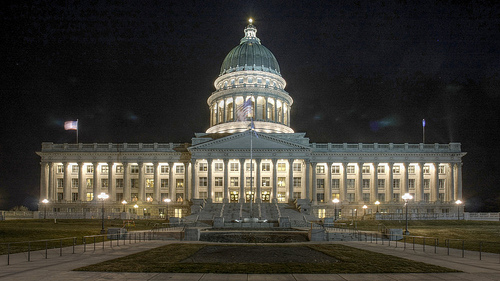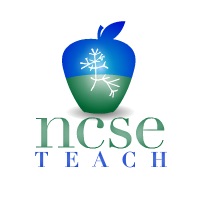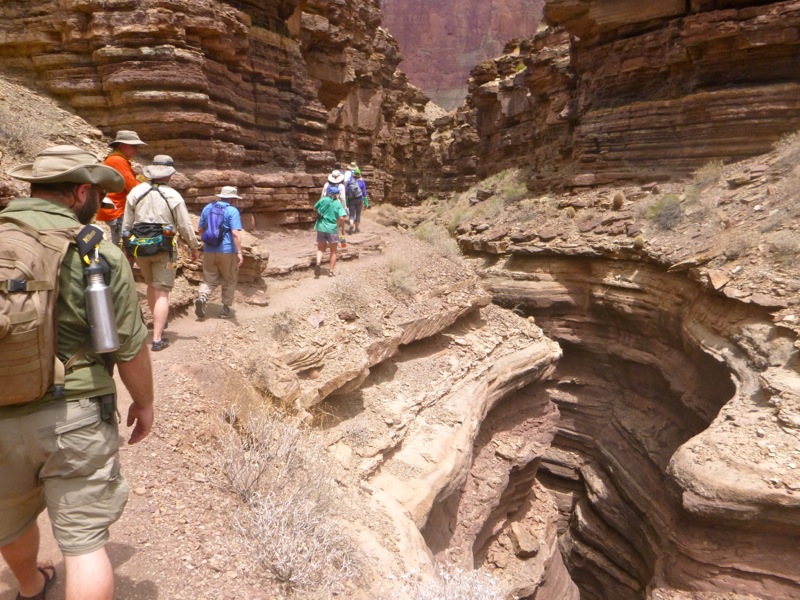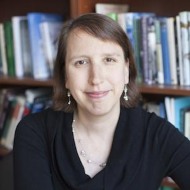
Every December I cross the San Francisco Bay to head into the “big city” to go to the American Geophysical Union (AGU) meeting. If you haven’t been to the meeting before, it is one of the largest scientific conferences in the country. Several tens of thousands of people come from around the world to present their research and hear about new innovations in the geosciences. When I attend, I get to hear about incredible feats of science—Mars landers, Venus vortices, improved methods of tsunami detection, and teaching climate change (yes, in some communities, that is a true feat!).
I also get to share the incredible things that NCSE has done each year. This year there was a lot to share! From tackling legislation and rogue boards of education, to working with educators to help them to teach the good stuff, we’ve had a busy year.
What the heck has NCSE been doing all year? Here's a little taste.
First and foremost we’ve tackled what we call “flare-ups.” That’s our in-house term—derived from epidemiology, not dermatology—for public controversies over climate change and evolution education. This is our bread and butter here at NCSE and 2015 was not shy about filling our plate.
State science standards were hot this year. There was Wyoming, where the state board of education had been forbidden to use state funds to adopt or review the Next Generation Science Standards due to the inclusion of climate change in the standards. There was West Virginia, where a rogue member of the board of education attempted to sneak misleading information about climate change into the new science standards. Evolution came into play in Utah, where a draft version of the middle school science standards did not include the term “evolution” and omitted the concept of natural selection. There was no shortage of anti-science legislation, with bills proposed in Alabama, Indiana, Iowa, Missouri, Oklahoma, and South Dakota. A bill in Montana even received a committee hearing. (To read more about these bills and their fates, check out our 2015 anti-science legislative scorecard.) In all of these cases, NCSE staff stepped in to work with the educational and scientific communities to support good science education. And to our great pleasure, in all cases we largely succeeded.
 That’s not all we did this year, though. In 2015, we also launched our first teacher network, NCSEteach, which grew from a few hundred to over 4,000 teachers in the first year alone. With NCSEteach we launched a new program, cleverly named Scientist in the Classroom, getting local scientists to come to classrooms to talk to teachers and students about climate change and evolution. We were also present at the National Association of Biology Teachers (NABT) meeting, co-convening the opening panel with NABT on addressing socially controversial topics in science classrooms. Featured in our panel were biologist and biology textbook author Ken Miller, author Seth Mnookin, and climatologist Jacqueline Gill.
That’s not all we did this year, though. In 2015, we also launched our first teacher network, NCSEteach, which grew from a few hundred to over 4,000 teachers in the first year alone. With NCSEteach we launched a new program, cleverly named Scientist in the Classroom, getting local scientists to come to classrooms to talk to teachers and students about climate change and evolution. We were also present at the National Association of Biology Teachers (NABT) meeting, co-convening the opening panel with NABT on addressing socially controversial topics in science classrooms. Featured in our panel were biologist and biology textbook author Ken Miller, author Seth Mnookin, and climatologist Jacqueline Gill.
Gosh, that’s a lot—but that’s not all!
Stephanie Keep, familiar to you from our blog, was also busy contributing to other educational blogs, webinars and making presentations to educators. And as if that weren’t enough, she has also been working hard behind the scenes on completely redesigning the Reports of the National Center for Science Education (RNCSE) newsletter. NCSE members can expect the new beautiful color edition in their mailbox this January. (And if you’re not a member, what on earth are you waiting for? It’s only $40! Join now.)
Meanwhile Emily Schoerning, our Director of Research and Community Organizing, has been working hard to launch our new Science Booster Clubs in Iowa. The first booster club in Iowa City already has more than 400 members and has provided informal climate change education to over 2000 people. The club also funded teacher grants with lasting impacts for over 400 students. The pilot launch this spring in three Iowa communities will be the focus of an evaluative study on how communities can better support science education.
 Josh Rosenau and Steven Newton, my fellow programs and policy directors, made some waves with their criticism of the New Age guru Deepak Chopra. They also valiently led our annual trip down the Grand Canyon, which for the first time included two teachers who came as part of a new scholarship program. Josh also has been leading our work on a new climate change education survey, to be released in the coming year. The results were rather shocking: Teachers are teaching about climate change, but you’ll be surprised about how. Expect to see the details of the survey in the coming year.
Josh Rosenau and Steven Newton, my fellow programs and policy directors, made some waves with their criticism of the New Age guru Deepak Chopra. They also valiently led our annual trip down the Grand Canyon, which for the first time included two teachers who came as part of a new scholarship program. Josh also has been leading our work on a new climate change education survey, to be released in the coming year. The results were rather shocking: Teachers are teaching about climate change, but you’ll be surprised about how. Expect to see the details of the survey in the coming year.
Robert Luhn, our communications director, has been working his tail off, getting NCSE staff into the media, nabbing us interviews with the Washington Post, The New York Times, and NPR. He also launched a complete redesign of our website (coming in 2016!) and expanded our social media followers to 150,000.
And there is so much more: I haven’t even mentioned what executive director Ann Reid and deputy director Glenn Branch have been up to, or our two interns Kate Heffernan and Forest Wakeling, or gotten to thank the support staff, Rae Holzman, Nina Hollenberg, and Stuart Fogg, for all they do to make sure that the office keeps up and running—but I’m running out of space! If you want to see all the cool things NCSE is up to, you can follow us on Twitter and Facebook, check out the News page of our website, and keep up with the blog…but you should also become a member to receive RNCSE quarterly and to support our important work.
Before I sign off for the year, I want to add that every single thing I mentioned in this blog post, up to and including the erasers and paperclips on my desk, could not happen without the generous donations of people just like you. Do you want to see us continue to defend and support the teaching of science in public schools? It’s not too late to contribute to NCSE this year. Go to ncse.com/donate today.

